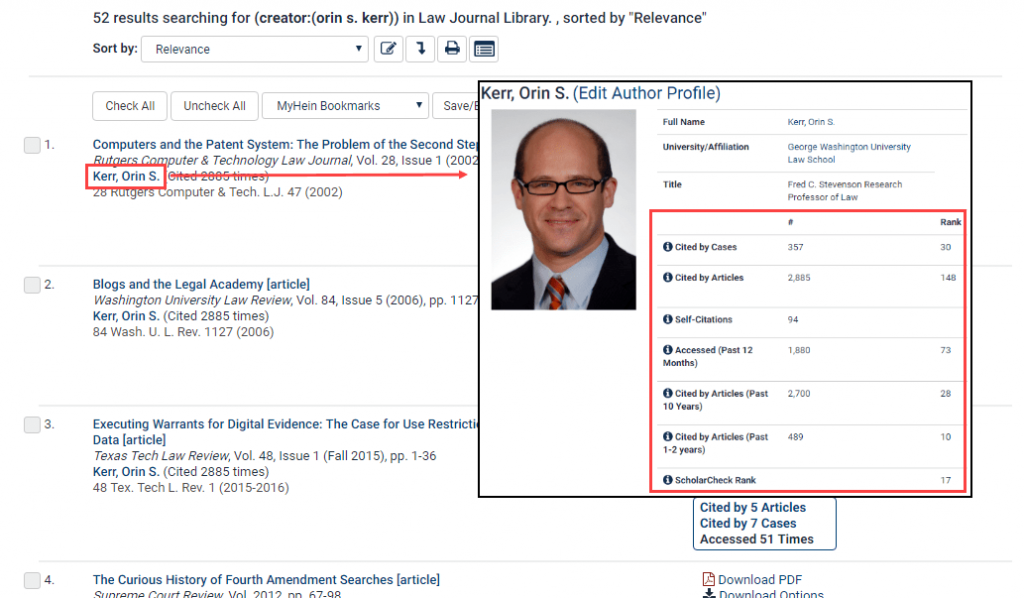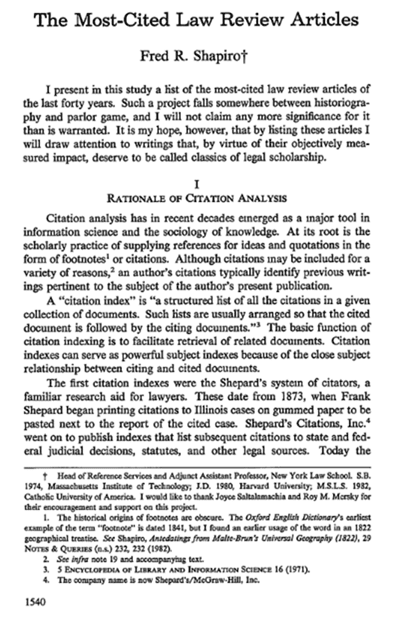Recently, HeinOnline added a metric to Author Profile Page citation data: Self-Citations. This metric counts the cumulative number of times that an author has cited his or her own work. It is not factored into the overall ScholarCheck ranking analysis, nor does it affect the overall citation count.
The concept of self-citation has been discussed for some time. This Scholarly Kitchen post, Do We Need a Self-Citation Index? inspired the development and addition of this metric to HeinOnline’s citation data.
About Self-Citation
Self-citation, which is simply citing one’s own previous work in a subsequent piece, seems to be a somewhat controversial yet also unavoidable practice. Self-citation is also discussed in terms of journals citing to work previously published in the same journal title, but the metric in HeinOnline currently applies only to individual authors.
In some fields, citation metrics weigh heavily upon individuals’ chances for promotion, grants, and tenure; obviously, citing one’s own work increases overall citation counts. This could be advantageous and reward those who abuse this practice. However, self-citation doesn’t impact legal scholarship in the same way, as citations are counted a bit differently. It is also fairly normal and quite common, especially in narrowly-focused fields and for scholars building upon previous work.
Because much of HeinOnline’s content is law-related, the new metric in HeinOnline does not affect the overall ScholarCheck ranking for authors. Self-citations are also not subtracted from overall citation counts and are there for informational purposes only.
To view an author’s profile, which includes all citation metrics, click the author’s name from search results or from within a journal issue’s table of contents.

Research the concept of self-citation in HeinOnline. For example, perform a proximity search in the Law Journal Library:
“self citations authors”~5 OR “self citations author”~5 OR “self citation authors”~5 OR “self citation author”~5
Results include relevant scholarship on this topic.
Perform a more general search for the phrase “self citations” and sort by Number of Times Cited by Articles to retrieve the most-cited article mentioning this phrase, which is coincidentally titled The Most-Cited Law Review Articles!

ScholarCheck Metric Summary
HeinOnline’s ScholarCheck tool ranks authors in HeinOnline based on the following metrics.
Cited by Cases: This metric counts the cumulative number of times this author has been cited by cases available in HeinOnline or via Fastcase.
Cited by Articles:This metric counts the cumulative number of times this author has been cited by other articles in HeinOnline. Citation sources include the Bluebook, Prince’s Bieber Dictionary of Legal Abbreviations, and the Cardiff Index to Legal Abbreviations.
Cited by Articles (Past 10 Years):This metric counts the cumulative number of times an author’s articles have been cited by other articles in HeinOnline written in the past 10 years only. This is a “currency factor”. Citation sources include the Bluebook, Prince’s Bieber Dictionary of Legal Abbreviations, and the Cardiff Index to Legal Abbreviations.
Cited by Articles (Past 1-2 Years): This metric counts the cumulative number of times an author’s articles have been cited by other articles in HeinOnline written in the past 12 – 24 months only. This is also a “currency factor”. Citation sources include the Bluebook, Prince’s Bieber Dictionary of Legal Abbreviations, and the Cardiff Index to Legal Abbreviations.
Accessed (Past 12 Months): This metric counts the cumulative number of times an author’s articles have been accessed by HeinOnline users within a rolling 12 month period. In order to count as being accessed, the article must be clicked from either search results or by browsing to the article, or retrieved using the citation navigator.
Each of these five metrics are weighted equally to calculate the overall ScholarCheck ranking. The new metric, Self-Citations, does not factor into the overall ScholarCheck ranking. This metric counts the cumulative number of times an author has cited his or her own articles in subsequently published articles.
Twitter Discussion on Self-Citation
The self-citation metric was added with last month’s content release. It was recently discussed on Twitter, beginning with a tweet from Orin S. Kerr, who is ranked 17th overall using HeinOnline’s ScholarCheck tool. The ranking is based on the number of times cited by cases; number of times cited by articles (overall, written in the past ten years, and written in the past two years); and number of times accessed by other HeinOnline users in the past 12 months.
HeinOnline's citation metrics now include a "self-citation" number — the cumulative # of citations to that scholar from that scholar. A new ranking of lawprofs based on their ratio of self-citations to total citations seems inevitable….
— Orin Kerr (@OrinKerr) December 11, 2017
The Twitter conversation continued and discussed how applying self-citations to a ranking could penalize those who specialize in a given field, along with guesses as to which authors self-cite the most. One person even suggested that men are more likely to self-cite than women:
I bet, even controlling for this, men self-cite far more than women (as studies show is the general trend).
— Aditi Juneja (@AditiJuneja3) December 11, 2017
Which is supported by this article from nature.com.
Twitter user @SCOTUSPlaces compiled a chart of the most self-citing authors and then updated the chart a few times to account for the highest percentage of self-citations and to include female scholars.
NEW: Most self-citing authors
— Jack Metzler (cleaned up) (@SCOTUSPlaces) December 11, 2017
Congrats Richard Delgado on being the most-self-citing scholar!
(@HeinOnline top 15 cited authors + selected others) pic.twitter.com/YCiA3jt4ty
@SCOTUSPlaces then amended the chart one final time to rank authors in HeinOnline after subtracting self-citations (which, to be clear, HeinOnline has not done):
Here's how @HeinOnline's ranking of most-cited authors looks when you subtract out the self-serv- that is, the self-citations. pic.twitter.com/vcIYs6edlZ
— Jack Metzler (cleaned up) (@SCOTUSPlaces) December 11, 2017
The top two authors from HeinOnline’s Top 250 Authors List, Cass R. Sunstein and Richard A. Posner, remain unchanged both with and without self-citations being counted. Many other rankings change with the removal of self-citations, according to @SCOTUSPlaces‘ formula.
Stay In Touch
HeinOnline is pleased that this new metric’s addition has stimulated so much thoughtful conversation on social media. Users are encouraged to further discuss this and to submit feedback about how we can further use the vast amount of data at our fingertips. For questions about this metric, or for searching and navigating in HeinOnline, contact our dedicated support team at (800) 277-6995, via email, or by live chat!



